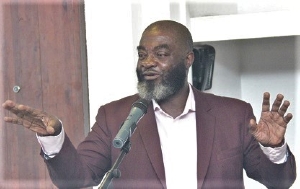As the global economy faces increasing economic and geopolitical challenges and business dynamics shift rapidly, the private sector must become more engaged in shaping public policy.
This was the primary takeaway when experts from across the spectrum converged at the Albert Kodi Hall of pan-African business law firm AB & David Africa for an Africa Business Conversation roundtable discussion.
There, they argued that the traditional role of businesses as mere economic actors is no longer sufficient. They said businesses deeply understand market trends, consumer preferences and technological advancements. This knowledge can inform policymakers and help them make informed decisions that benefit both the economy and society as a whole.
Consequently, companies must take a more proactive stance, advocating for policies that support their long-term growth and sustainability.
Elaborating on this, Founder and Executive Chairman of AB & David, Dr. David Ofosu-Dorte said: “In challenging times, businesses bear a bigger part of the burden; but oftentimes it appears that they are not the focus of policymakers when it comes to making decisions for the future. Businesses are eager to work with government to address prevailing headwinds, but feel their voices are not being heard”.
In view of this, he explained, AB & David’s Public Sector Advisory & Government Business Practice Group convened the roundtable discussion to explore strategies for Ghanaian businesses to collectively influence economic policy formulation for 2025 and beyond.
“We must be focused on what exactly is coming, I believe that we should be engaging with technocrats by asking, ‘What are you putting in the budget?’ ‘What are you suggesting should appear this time?’ So that we can have an idea about it ahead of time as much as possible,” the lawyer added, as he cited policy uncertainty as the biggest concern businesses have.
The roundtable is part of AB & David’s broader effort to empower the private sector and foster a more constructive dialogue between businesses and policymakers.
By bringing together industry leaders and government officials, the firm hopes to identify concrete ways for Ghanaian companies to shape the country’s economic agenda.
The Chief Executive Officer (CEO) of the Association of Ghana Industries (AGI), Seth Twum Akwaboah, acknowledged that differing interests among AGI members can sometimes hinder their ability to present a unified front. He explained that these competing interests can arise from various factors, such as differences in industry sectors, company sizes or regional locations.
Despite these challenges, Mr. Akwaboah expressed optimism that ongoing advocacy efforts to promote the benefits of a stronger collective voice have been effective and will continue to yield positive results.
He believes that by emphasising the advantages of unity, AGI can more effectively advocate for policies that support local industries’ growth and development.
“Although differing perspectives may sometimes exist, we are committed to working together on advocating in the best interests of businesses – and we continue to see results,” he noted.
On his part, former Board Chair-Ghana Revenue Authority (GRA) Dr. Anthony Oteng-Gyasi urged businesses to prioritise research, emphasising that long-term benefits significantly surpass the initial costs.
He also stressed the importance of collaboration, encouraging businesses to avoid working in isolation and instead build strategic partnerships with various stakeholders, including the media.
Furthermore, Dr. Oteng-Gyasi challenged industry associations to be more assertive in their engagement with government. While acknowledging that initial resistance might be encountered, he asserted that governments are more likely to listen to clear and well-presented proposals.
“Businesses should also collaborate and be more proactive in their interactions with government,” he stated.
Managing Director-Ghana Stock Exchange (GSE) Abena Amoah highlighted GSE’s dedication to fostering a strong relationship with the media.
“Through regular training sessions, GSE equips journalists with the knowledge and skills necessary to accurately report on complex financial market issues,” she explained.
Already, GSE’s ‘Facts Behind the Figures’ sessions offer an additional platform for information-sharing, enabling the media to provide well-informed and impactful coverage of the stock market.
CEO-Business & Financial Times (B&FT), Dr. Godwin Acquaye, reaffirmed his organisation’s commitment to leveraging its diverse platforms – including print, digital and industry-leading events like the Ghana Economic Forum – to foster constructive policy discussions and shape economic development in Ghana.
Business News of Wednesday, 4 September 2024
Source: thebftonline.com

















